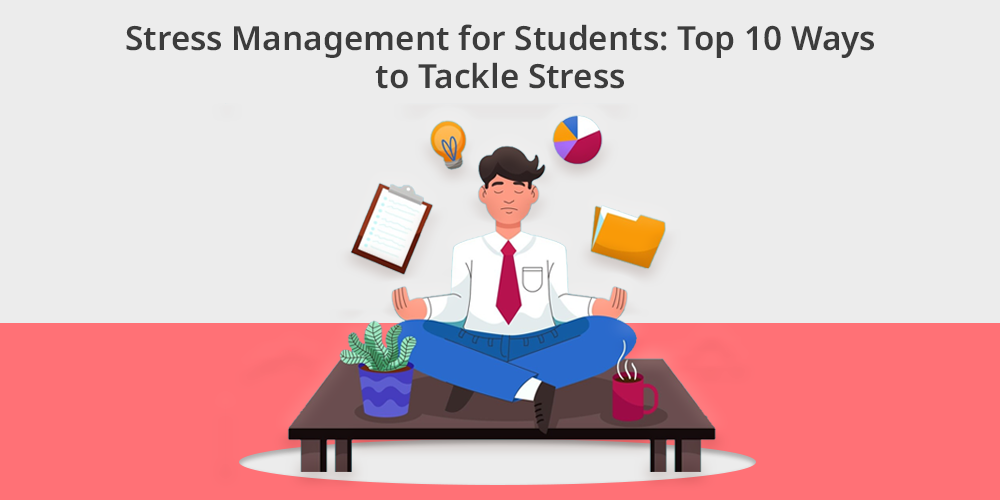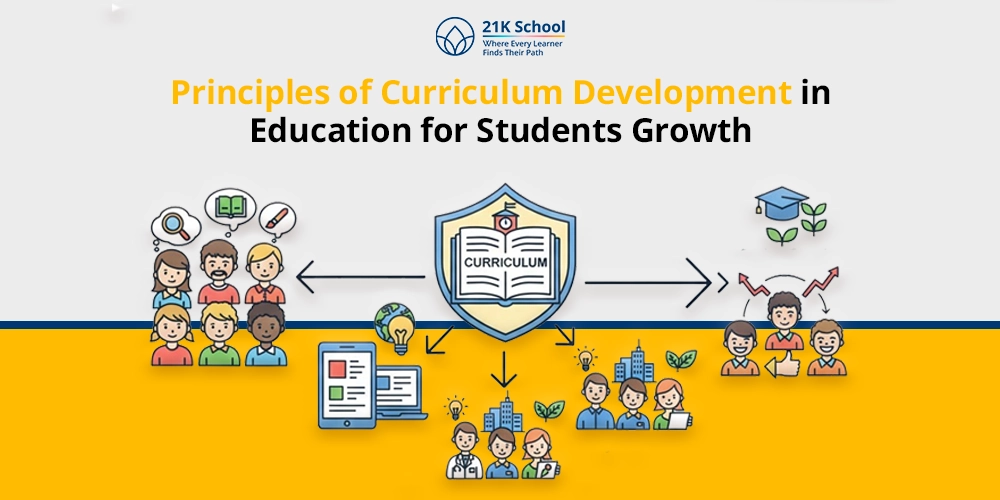
Have you ever wondered why new generation students are more stressed?
With the generation gap, today’s modern children are more stressed. Stress has become very common among high school and college students, which hinders their true potential in the learning process.
Stress hampers kids’ behaviour and causes them to develop physical and mental health challenges. It is essential for students to manage their stress for effectiveness and to alleviate health-related issues.
Stress occurs in students due to various factors such as academic pressure, exam failure, parental pressure, career pressure, and so on. Stress is overwhelming for students, which sometimes causes them to indulge in bad habits.
Stress and anxiety cause students to perform poorly in their academics and hinder their lifelong learning. A proper physical and active mind helps them to participate in social activities and enhance a child’s mental health.
Table of Contents
Effective Ways to Manage Stress in Students
Stress management is very essential for children to enhance their learning outcomes. Students can manage their stress through indulging in various activities and following a healthy and balanced lifestyle.
Proper management of stress enables students to create a positive learning environment and helps them to cope with anxiety and depression as well. Below, you can check the effective ways to manage stress in students.
1. Mindfulness Activities
One of the effective ways to manage stress is through mindfulness in the classroom. Mindfulness assists students in enhancing their awareness and enhancing their critical thinking skills.
Mindfulness activities in the classroom allow students to promote holistic education among students, which allows them to effectively enhance their sensory effects. This helps students to effectively manage their stress and find solutions to problems.
2. Proper Routine
An effective schedule enhances effectiveness and allows students to utilise time properly. A proper study routine enables children to work effectively, which helps in reducing work pressure and allows them to manage stress and anxiety.
Poor study schedules cause students to panic in any situation and find it tough to manage their time. A good study schedule allows students to cope with the stress and study effectively without any difficulty.
3. Proper Sleep
A proper and good sleep is very essential to stay fresh and keep your mind active. A good sleep aids in the cognitive development of children.
Improper sleep causes students to develop various health-related issues such as sleep insomnia, sleep deprivation, depression and so on, due to which they perform badly in class activities and exams. Sleep disorder is the main cause of anxiety and stress among students, which hinders their performance.
4. Regular Exercise
Doing exercises daily is one of the effective ways to manage stress. Students can indulge in physical exercises such as cycling, gyming, walking, running, yoga, jogging, swimming, and so on.
Regular exercises release hormones such as endorphins and dopamine, which help in increasing the feeling of happiness. Outdoor activities for kids enable them to reduce their stress and anxiety as well as promote their physical health.
5. Listening to Music
Music listening helps in creating a soothing environment that allows students to develop confidence and attention.
Listening to music daily allows students to develop cognitive skills and a calm body and mind. Listening to classical and soft music helps in keeping the mind relaxed and develops students’ mental health.
6. Healthy Diet
Eating a nutritious and healthy diet aids students in promoting good health. Eating junk and oily food affects students’ health adversely, causing them to become hyperactive.
Eating homemade healthy foods enables them to stay healthy and fit, which also allows them to cope with stress.
Children must avoid eating junk foods or street foods, which can cause them to get obese and affect their health badly. A bad, unhealthy diet causes students to develop aggression and behavioural problems.
7. Watching Movies
Watching movies helps to stay relaxed and provides enjoyment. Watching films helps children to reduce stress and promotes their mental health.
Students can watch various types of films such as animation films, action movies, Sci Fi movies, nature films, documentaries and so on. Watching films daily helps in enhancing creative thinking skills and reducing depression and isolation.
8. Reduce Smartphone Addiction
Smartphone addiction has become a big cause of stress among students. Due to smartphone addiction, children find it tough to concentrate and develop behavioural issues, stress, anxiety, depression, etc.
Limiting screen time for kids and avoiding smartphones helps to cope with stress. This allows students to effectively engage in classroom activities and study sessions.
9. Enhance Socialisation
Socialisation and spending time with friends and peers also help students to reduce stress and promote calmness. Indulging in social activities and spending time with friends helps to eliminate stress, which allows individuals to effectively engage in social-emotional learning.
Staying isolated and a lack of social skills cause negative effects on kids’ health, and due to this, they feel more depressed and anxious. Spending time with others helps in coping with stress.
10. Meditation
Meditation is an incredible way to reduce stress among students. Meditation helps in improving emotional health and general well-being, which allows one to stay calm and relaxed.
Meditation helps in maintaining inner peace and developing social skills.
Causes of Stress in Students
Stress occurs in students due to various problems that hamper their learning capacity. Due to stress, students develop anxiety and depression, which leads to serious health issues both physically and mentally.
Here you can check what the causes of stress in students are that hinder their learning process.
1. Improper Sleep
Improper sleep is the main cause of stress in students. Many students have developed a late-night sleeping habit, due to late sleeping habits the brain doesn’t work properly and causing them sleep deprivation.
Lack of proper sleep causes children to have sleep insomnia that hampers their class activities. Sleep disorder is the main cause of anxiety and stress among students, which hinders their performance. Therefore, it is essential for parents to develop a proper bedtime routine for kids.
2. Poor Time Management Skills
Time management skills are very important for working effectively. Poor time management skills provide students with an extreme workload due to which causes them to develop stress.
Lack of time management skills causes students to develop disruptive behaviours, and makes it tough for them to do any task with effectiveness.
3. Bullying and Harassment
Bullying and harassment are common causes of stress in students. Bullying due to racism, gender discrimination, economic factors, social factors, etc., causes students to develop stress and anxiety.
Bullying and harassment from peers, seniors and sometimes from teachers and staff cause students to develop fear and depression. Bullying causes students to develop poor social skills and affects their mental health.
4. Environmental Issues
Environmental issues are one of the major causes of stress among students. Environmental issues such as poor infrastructure, noise, bad air quality, violence, and lack of proper physical surroundings cause children to develop stress and make them feel overwhelmed.
Even sometimes, teachers’ negligence also hampers students’ participation and makes them feel isolated.
5. Educational Pressure
Educational pressure is also one of the major reasons for stress in students. Academic pressure contains exam stress, fear of failure, high expectations, grade competition, peer competition, etc.
This allows students to develop stress and anxiety, especially during exam period. Academic stress causes students’ depression and hampers their health. Taking classes through virtual learning platforms also helps in eliminating stress.
6. Lack of Parental Support
Lack of parental support also causes students to develop stress and anxiety. As young children need support and guidance in their very strong whether it is in studies or any activities.
Due to a lack of support in their work, they find it difficult to cope with their assignments, which will cause them to experience stress and fear. Due to this reason, they find it difficult to adjust to others and develop complexes.
7. Health Issues
Health issues are also one of the major reasons that cause children to develop stress. Health issues such as insomnia, genetic disorders, neurological factors, depression, disease, etc.
Cause them to perform poorly in the classroom activities. Due to this reason, they develop a fear of social skills and find it tough to set in a collaborative learning environment. Proper treatment and therapy are effective ways to reduce stress and health factors.
Health Effects of Stress in Students
Stress hampers students’ health both mentally and physically, due to which it hinders their potential. Short-term stress is a natural phenomenon that helps to fight the obstacles; however, chronic stress has negative effects on health.
Extreme stress causes students to have depression, heart diseases, hampers their immune system, stomach problems, mental health issues and so on.
Understanding stress and its diseases is essential to managing them effectively to stay healthy and enhance the learning process. Here are the health effects of stress in students.
1. Physical Health Effects
Physical health effects are the common health effects that negatively affect them, physical health effects include headaches, stomachache, heart diseases, high blood pressure, constipation, muscle tension, sleep insomnia, stroke, dizziness, body aches, and so on.
These types of physical problems affect the health of children and teens.
2. Mental Health Effects
Mental health effects are a state of a person’s mind. This includes headaches, dizziness, depression, anxiety, mood swings, exhaustion, brain fog, mental shock, trauma, poor concentration, etc.
These types of mental health issues cause students to feel overwhelmed and hinder their daily activities.
3. Behavioural Health Effects
Behavioural health effects can be understood by the behaviour and actions of students. The behavioral health effects include nail biting, changing in food habits, alcoholism, smoking, doping, leg shaking, grinding teeth, restlessness, withdrawal symptoms, etc.
These types of behavioral symptoms are the most common health effects that hampers students’ way of socialization.
Summing Words
Students now worry a lot about stress since it has an impact on their general well-being, academic performance and mental and physical health. Students can practice mindfulness, regular exercise, decent sleep, a balanced diet and socialising as ways to effectively manage stress.
Stress can also be reduced by reducing smartphone addiction, engaging in meditation and creating a healthy routine.
By being aware of the reasons behind stress and how it affects health, educators, parents, and students can create a collaborative learning environment to establish a nurturing atmosphere that encourages stress reduction and general well-being.



